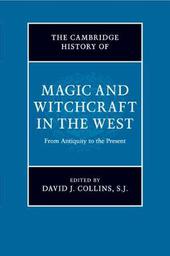
|
The Cambridge History of Magic and Witchcraft in the West: From Antiquity to the Present
Paperback / softback
Main Details
| Title |
The Cambridge History of Magic and Witchcraft in the West: From Antiquity to the Present
|
| Authors and Contributors |
Edited by David J. Collins, S. J.
|
| Physical Properties |
| Format:Paperback / softback | | Pages:810 | | Dimensions(mm): Height 230,Width 153 |
|
| Category/Genre | Religion - general |
|---|
| ISBN/Barcode |
9781108703079
|
| Classifications | Dewey:133.4309 |
|---|
| Audience | | Professional & Vocational | |
|---|
| Illustrations |
Worked examples or Exercises; 46 Halftones, unspecified; 46 Halftones, black and white; 20 Line drawings, black and white
|
|
Publishing Details |
| Publisher |
Cambridge University Press
|
| Imprint |
Cambridge University Press
|
| Publication Date |
20 December 2018 |
| Publication Country |
United Kingdom
|
Description
This book presents twenty chapters by experts in their fields, providing a thorough and interdisciplinary overview of the theory and practice of magic in the West. Its chronological scope extends from the Ancient Near East to twenty-first-century North America; its objects of analysis range from Persian curse tablets to US neo-paganism. For comparative purposes, the volume includes chapters on developments in the Jewish and Muslim worlds, evaluated not simply for what they contributed at various points to European notions of magic, but also as models of alternative development in ancient Mediterranean legacy. Similarly, the volume highlights the transformative and challenging encounters of Europeans with non-Europeans, regarding the practice of magic in both early modern colonization and more recent decolonization.
Author Biography
David J. Collins, S. J., is Associate Professor of History at Georgetown University, Washington DC. His research has been supported by prestigious fellowships from the Charlotte Newcombe Foundation, the Alexander Humboldt Foundation, and the Gerda Henkel Foundation. He has published extensively on the medieval cult of the saints, Renaissance humanism, and learned magic, especially in central Europe. He is currently working on the reception of Albertus Magnus' teachings on magic in the early modern period.
Reviews'This impressive collective volume proposes a coherent history of learned magic in Western Europe and the colonial world between Christianization and contemporary neo-paganism. It has found an access to magic that contrasts with the many studies that situate magic in a religious or anthropological context, and thus is a welcome and necessary supplement and corrective. Giordano Bruno would have relished it.' Fritz Graf, Ohio State University 'This volume offers a rich and exciting set of essays that will prove invaluable to scholarly discussions of Western magic and witchcraft. With contributions from a range of innovative scholars, the collection masterfully intertwines expansive historical and cultural insight with creative theoretical reflection.' Randall Styers, University of North Carolina, Chapel Hill 'This important and ambitious collection of twenty authoritative essays ... is likely to become a standard work in the field because of the quality of the contributions, and the unprecedented wide range of material covered in a single volume ... the choice of chapters and selection of scholars would be hard to better ... it ought to be on the shelf of every historian of religion, let alone historians of witchcraft and magic.' Francis Young, Journal of Jesuit Studies '... this volume is well constructed, thoughtful, and interesting, with contributing authors of high scholarly standing. It is recommended to readers interested in magic and witchcraft, and their close relatives - religion and esotericism - across a broad historical and geographical sweep.' Carole M. Cusack, Church History 'There can be no doubt that it is a welcome addition to magic and witchcraft studies since it offers a refreshing number of departures from tired cliches, and invites the reader to think about magic beyond the boundaries of western Europe. ... Both Collins and his contributors are to be congratulated on their ambition for this volume, and its individual accomplishments.' Peter Maxwell-Stuart, The Journal of Ecclesiastical History
|